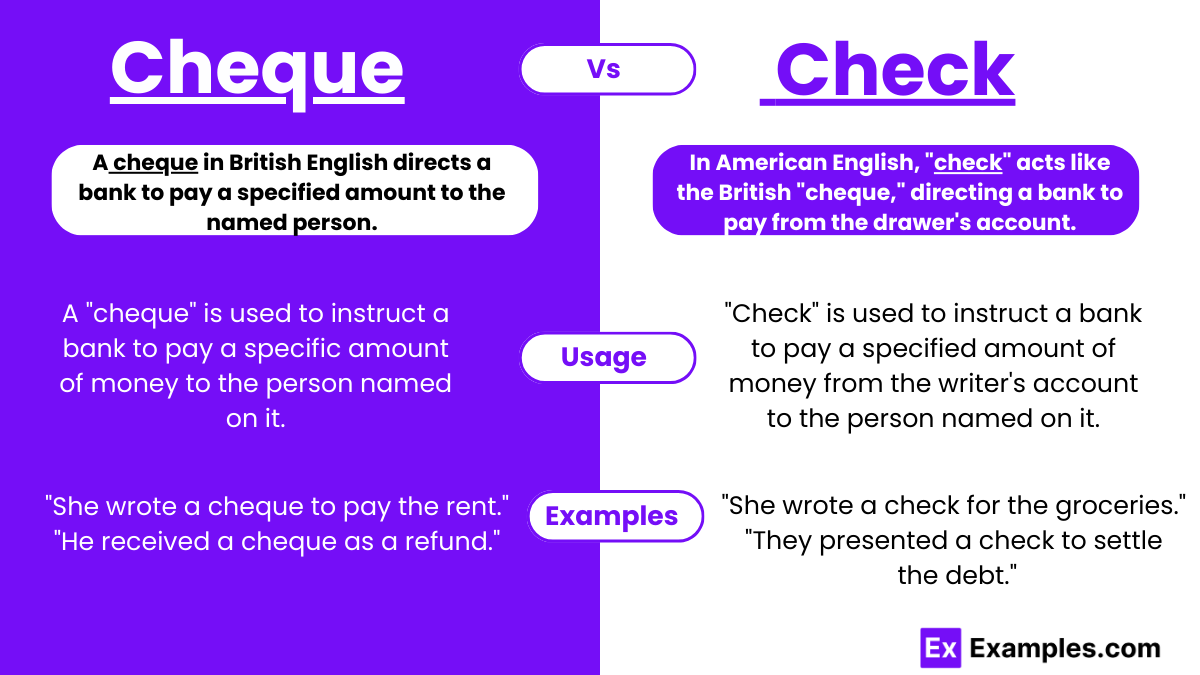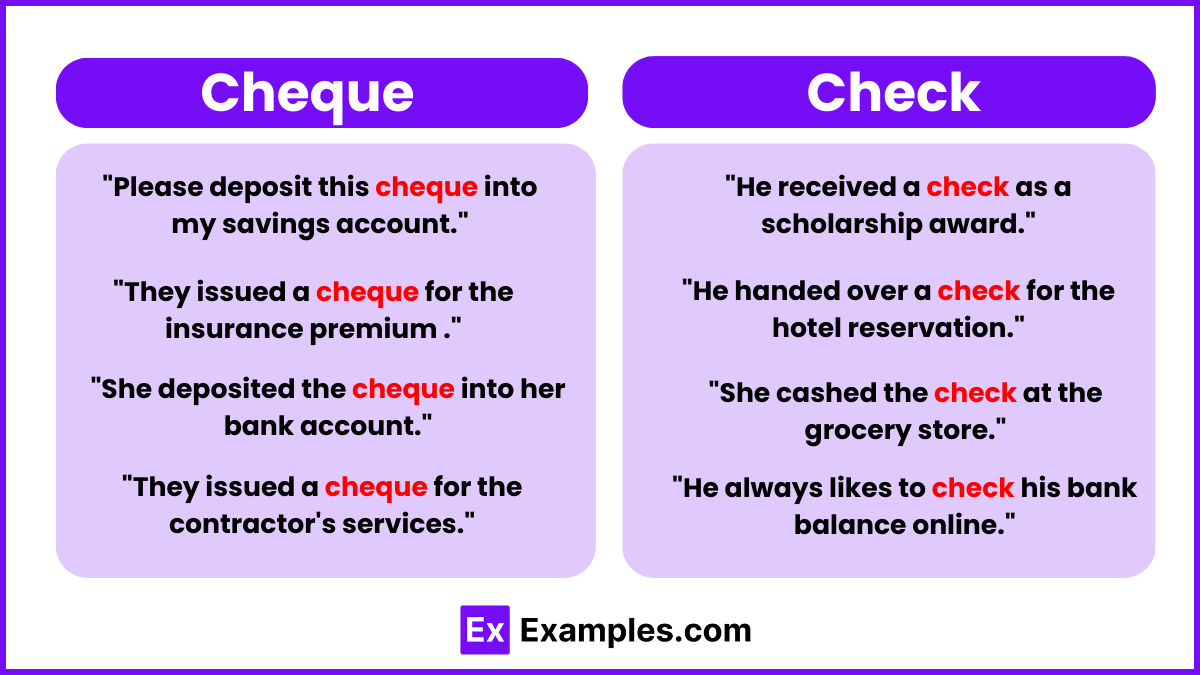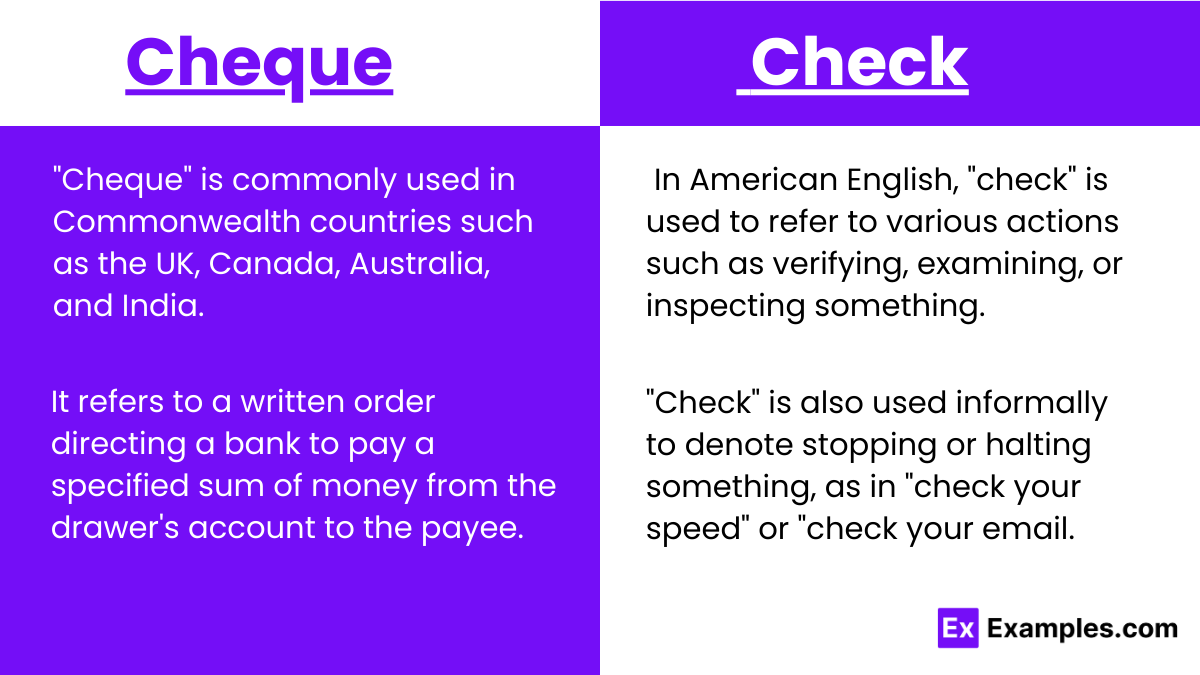Cheque vs Check – Examples, Differences, Usage, Tips
The English vocabulary often brings us to the shores of regional differences, a prime example being the terms “cheque” and “check.” While both share the same pronunciation and foundational meaning related to monetary transactions, their usage diverges across the Atlantic. In the realm of British English, “cheque” is the preferred term for a written order directing a bank to pay a specific amount from one’s account. On the other hand, American English adopts “check” for this financial instrument, extending its utility to encompass various other meanings both as a noun and a verb, from verification marks to actions of restraint or examination.
This linguistic dichotomy reflects not just a simple spelling variation but a deeper cultural and historical evolution of the English language. In British contexts, “cheque” remains reserved for financial dealings, maintaining a clear boundary from its homophone “check,” which Britons employ in situations calling for verification, control, or inspection. This distinction, while subtle, is pivotal for students and language enthusiasts aiming to master the nuances of English. Understanding the appropriate contexts and regions for each term’s use not only enriches one’s vocabulary but also polishes the precision and authenticity of cross-cultural communication.
Cheque and Check – Meanings
Cheque: A “cheque” is a written document, predominantly used in British English, instructing a bank to deduct a specified amount of money from the writer’s bank account and pay it to the person named on the document. This financial instrument is a secure method of payment, ensuring the transfer of funds without the need for physical currency. The term “cheque” is strictly used in financial contexts within regions that follow British English conventions, serving as a formal agreement between the payer and the payee that the stated amount is legally owed and payable.
Check: In American English, “check” serves a dual purpose. Primarily, it mirrors the British “cheque” in the banking sense, referring to a written order directing a bank to pay a specific sum from the drawer’s account. Beyond this financial use, “check” encompasses a wider array of meanings both as a noun and a verb. As a noun, it can denote a verification mark, a stoppage, or a bill in a restaurant, among others. As a verb, “check” implies actions such as examining, verifying, or restraining. This versatility makes “check” a multifaceted term integral to various aspects of American English discourse.
Summary
In the English language, “cheque” represents the British term for a payment order to a bank, while its American counterpart, “check,” is employed in the same financial context. Beyond its banking use, “check” in American English extends to a variety of meanings, serving as a noun in scenarios like confirmation symbols or sports maneuvers, and as a verb in actions related to examination or restriction. This divergence highlights the lexical richness and regional nuances within English, where a single term can encompass multiple facets of daily communication.
Difference Between Cheque and Check
“Cheque” and “Check” showcase the fascinating variance in British and American English, extending beyond finance to diverse meanings and uses.
| Aspect | Cheque | Check |
|---|---|---|
| Region | British English | American English |
| Primary Use | Financial document for bank payments | Financial document; also various other uses |
| Other Meanings | None | Verification mark, restraint action, inspection |
| In Sports | Not applicable | Term used in games like hockey |
| As a Verb | Not typically used | To inspect, verify, or limit |
| In Restaurants | Not used; “bill” is preferred | Used to refer to the bill |
| Cultural Context | Strictly financial | Financial and beyond, in everyday language |
| Spelling Variation | Unique to financial document | Used across different contexts |
| In Writing | Refers solely to banking instrument | Used in various contexts, including writing checks |
| Lexical Flexibility | Limited to financial transactions | Broad, used in numerous settings. |
Examples of Cheque and Check
The terms “Cheque” and “Check” serve distinct functions across British and American English, illustrated through specific examples in financial and various contexts.
Cheque Examples:
- He wrote a cheque for £200 to cover the bill.
- Please deposit this cheque into my savings account.
- The charity received a generous donation by cheque.
- I’ll need a cheque to secure the booking.
- The refund will be issued via cheque within two weeks.
Check Examples:
- Could you check the oil level in the car?
- She left a check for the meal on the table.
- Make sure to check off each item on the list.
- The hockey player delivered a powerful check into the boards.
- I’ll need a background check for the new job.
When to Use Cheque and Check
The terms “cheque” and “check” are often confusing due to regional variations in spelling. “Cheque” is primarily used in British English, while “check” is prevalent in American English. Understanding their differences is crucial.
Certainly, here are the distinctions between “cheque” and “check”:
Usage of Cheque:
- British English: “Cheque” is the standard spelling used in British English.
- Banking Transactions: It refers to a written order directing a bank to pay a specified sum of money from the drawer’s account to the payee.
- Commonwealth Countries: “Cheque” is commonly used in Commonwealth countries such as the UK, Canada, Australia, and India.
- Official Documentation: It is used in official documents, financial statements, and banking-related paperwork.
Usage of Check:
- American English: “Check” is the preferred spelling in American English.
- Verification or Examination: In American English, “check” is used to refer to various actions such as verifying, examining, or inspecting something.
- Banking Usage: While “cheque” is used in Commonwealth countries, “check” is used for similar banking transactions in the US, such as issuing or depositing a check.
- Informal Usage: “Check” is also used informally to denote stopping or halting something, as in “check your speed” or “check your email.”
Tips for Cheque and Check
Mastering the distinction between “Cheque” and “Check” can enhance your linguistic precision, especially in international contexts. Here are some tips to guide you:
- Regional Usage: Remember that “cheque” is used in British English primarily for banking, while “check” in American English encompasses this and more.
- Financial Transactions: Use “cheque” when referring to a written payment order in British English contexts. Opt for “check” in American settings.
- Beyond Banking: Recognize that “check” in American English has multiple uses, including as a verb for verifying or examining something, and as a noun in various scenarios like dining out or sports.
- Context Clues: Pay attention to the context. If it’s financial and British, “cheque” is likely correct. In American English or non-financial contexts, “check” is probably right.
- Cultural Nuances: Be aware of cultural references. “Check, please” in a restaurant means asking for the bill in the U.S., not applicable with “cheque.”
- Proofreading: Especially in formal writing, double-check (no pun intended) the usage to ensure it aligns with the intended regional English variant.
- Practice: Engage with both British and American English texts to see these words in action, helping reinforce their proper usage.
By incorporating these strategies, you can confidently navigate the nuances between “cheque” and “check,” ensuring clarity and correctness in your communication.
FAQs
Why Do Americans Say Check Instead of Cheque?
Americans use “check” due to spelling conventions in American English, which differ from British English where “cheque” is used for banking terms.
Can I Get the Check or Cheque?
In the US, you’d ask for the “check” in a restaurant, while in the UK, it’s more common to request the “bill” rather than a “cheque.”
Is It a Cheque Book or Check Book?
In British English, it’s a “cheque book,” whereas in American English, the term is “checkbook” for the booklet used to write checks.
Do Banks Still Give Cheque Books?
Yes, banks still provide cheque books, although their usage has declined with the rise of digital payments and online banking.
How Do I Withdraw Money from a Cheque?
To withdraw money from a cheque, endorse the back and deposit it into your bank account, then withdraw cash using your debit card or a withdrawal slip.





